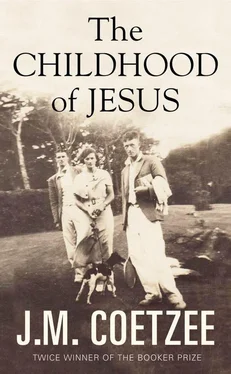‘No, of course not. You are neither invisible nor dead.’ He gropes on the floor, finds the candle, lights it. ‘Show me your hand. I don’t see anything wrong with your hand.’
‘It hurts.’ The boy sucks his fingers.
‘You must have burned it. I will go and see if the lady is still awake. Perhaps she can give us some butter to take away the burn.’ He passes the boy into Inés’s arms. She embraces him, kisses him, lays him down on the bed, croons softly over him.
‘It’s dark,’ says the boy. ‘I can’t see anything. Am I inside the mirror?’
‘No, my darling,’ says Inés, ‘you aren’t inside the mirror, you are with your mother, and everything is going to be all right.’ She turns to him, Simón. ‘Fetch a doctor!’ she hisses.
‘It must have been magnesium powder,’ he says. ‘I fail to understand how your friend Daga could have given a child such a dangerous present. But then’ — malice overcomes him — ‘there is much that I fail to understand about your friendship with that man. And please shut the dog up — I am sick of his insane barking.’
‘Stop complaining! Do something! Señor Daga is none of your business. Go!’
He leaves the cabin, follows the moonlit path to the señora’s office. Like an old married couple , he thinks to himself. We have never been to bed together, not even kissed, yet we quarrel as if we have been married for years!
The child sleeps soundly, but when he wakes it is clear that his sight is still impaired. He describes rays of green light travelling across his field of vision, cascades of stars. Far from being upset, he seems enthralled by these manifestations.
He knocks at señora Robles’ door. ‘We had an accident last night,’ he tells her. ‘Our son needs to see a doctor. Where is the nearest hospital?’
‘Novilla. We can call for an ambulance, but it would have to come from Novilla. It will be quicker to take him yourself.’
‘Novilla is quite a distance. Is there no doctor nearby?’
‘There is a surgery in Nueva Esperanza, about sixty kilometres from here. I will look up the address for you. The poor child. What happened?’
‘He was playing with inflammable material. It caught fire and the glare blinded him. We thought his sight might come back overnight but it hasn’t.’
Señora Robles clucks sympathetically. ‘Let me come and take a look,’ she says.
They find Inés chafing to go. The boy sits on the bed, wearing the black cloak, his eyes closed, a rapt smile on his face.
‘Señora Robles says there is a doctor an hour’s drive from here,’ he announces.
Señora Robles kneels down stiffly before the boy. ‘Sweetheart, your father says you can’t see. Is it true? Can’t you see me?’
The boy opens his eyes. ‘I can see you,’ he says. ‘You’ve got stars coming out of your hair. If I close my eyes’ — he closes his eyes — ‘I can fly. I can see the whole world.’
‘That’s wonderful, being able to see the whole world,’ says señora Robles. ‘Can you see my sister? She lives in Margueles, near Novilla. Her name is Rita. She looks like me, only younger and prettier.’
The boy frowns with concentration. ‘I can’t see her,’ he says at last. ‘My hand is too sore.’
‘He burned his fingers last night,’ he, Simón, explains. ‘I was going to ask you for some butter to put on the burn, but it was late and I didn’t want to wake you.’
‘I’ll fetch the butter. Have you tried washing his eyes with salt?’
‘It is the sort of blindness you get from looking into the sun. Salt won’t help. Inés, are we ready to leave? Señora, how much do we owe you?’
‘Five reals for the cabin and two for the supplies last night. Would you like some coffee before you leave?’
‘Thank you, but we don’t have time.’
He takes the boy’s hand, but the boy tugs himself free. ‘I don’t want to go,’ he says. ‘I want to stay here.’
‘We can’t stay. You need to see a doctor and señora Robles needs to clean the cabaña for her next visitors.’
The boy folds his arms tightly, refusing to budge.
‘I’ll tell you what,’ says señora Robles. ‘You go off to the doctor and on the way back you and your parents can come and stay with me again.’
‘They are not my parents and we are not coming back. We are going to the new life. Will you come with us to the new life?’
‘Me? I don’t think so, sweetheart. It’s kind of you to invite me, but I have too many things to do here, and anyway I get carsick. Where are you going to find this new life?’
‘In Estell. . In Estrellita del Norte.’
Señora Robles shakes her head dubiously. ‘I don’t think you will find much of a new life in Estrellita. I have friends who moved there, and they say it is the most boring place in the world.’
Inés intervenes. ‘Come,’ she commands the boy. ‘If you don’t come I will have to carry you. I am counting to three. One. Two. Three.’
Without a word the boy rises and, lifting the hem of his cloak, trudges down the path to the car. Pouting, he takes his place on the back seat. The dog leaps in easily after him.
‘Here is the butter,’ says señora Robles. ‘Smear it on your sore fingers and wrap a handkerchief around them. The burn will soon go away. Also, here is a pair of dark glasses that my husband doesn’t use any more. Wear them until your eyes get better.’
She puts the glasses on the boy. They are far too large, but he does not remove them.
They wave goodbye and take the road north.
‘You shouldn’t tell people we are not your parents,’ he remarks. ‘In the first place, it is not true. In the second place, they may think we are kidnapping you.’
‘I don’t care. I don’t like Inés. I don’t like you. I only like brothers. I want to have brothers.’
‘You are in a bad mood today,’ says Inés.
The boy pays no heed. Through the señora’s dark glasses he stares into the sun, fully risen now above the line of blue mountains in the distance.
A road sign comes into view: Estrellita del Norte 475 km, Nueva Esperanza 50 km . Beside the sign stands a hitch-hiker, a young man wearing an olive-green poncho with a rucksack at his feet, looking very lonely in the empty landscape. He slows down.
‘What are you doing?’ says Inés. ‘We don’t have time to pick up strangers.’
‘Pick up who?’ says the boy.
In the rear-view mirror he can see the hitch-hiker trotting towards the car. Guiltily he accelerates away from him.
‘Pick up who?’ says the boy. ‘Who are you talking about?’
‘Just a man begging for a lift,’ says Inés. ‘We don’t have space in the car. And we don’t have time. We have to get you to a doctor.’
‘No! If you don’t stop I am going to jump out!’ And he opens the door nearest him.
He, Simón, brakes sharply and switches off the engine. ‘Don’t ever do that again! You can fall and kill yourself.’
‘I don’t care! I want to go to the other life! I don’t want to be with you and Inés!’
A stunned silence falls. Inés stares at the road ahead. ‘You don’t know what you are saying,’ she whispers.
A crunch of footsteps, and a bearded face appears at the driver’s window. ‘Thank you!’ the stranger pants. He yanks open the back door. ‘Hello, young man!’ he says, then freezes as the dog, stretched out on the seat beside the boy, raises his head and gives a low growl.
‘What a huge dog!’ he says. ‘What’s his name?’
‘Bolívar. He is an Alsatian. Be quiet, Bolívar!’ Wrapping his arms around the dog, the boy wrestles him off the seat. Reluctantly the dog settles on the floor at his feet. The stranger takes his place; the car is suddenly full of the sour smell of unwashed clothing. Inés winds down her window.
Читать дальше












